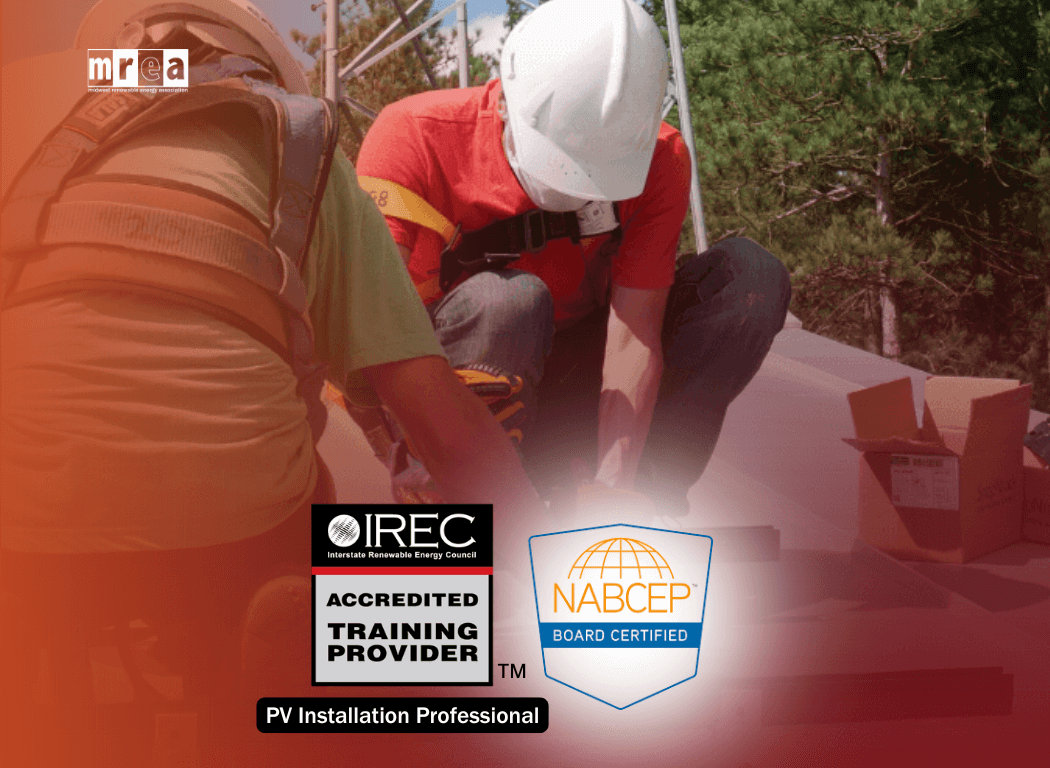The PV Installation Professional (PVIP) Board Certification validates your competence to perform in the role of PV Installation Professional, which encompasses PV design, installation, operations, commissioning and maintenance,
PROGRAM REQUIREMENTS:
- 58 hours of Advanced Training
- OSHA 10
- Must be at least 18 years of age
- Must document experience
Please note that MREA is not a provider of OSHA training, field experience, or project credits. See NABCEP Certification Handbook for details.

Advanced Training Requirements
A minimum of 58 hours of advanced PV training is required for each candidate pursuing their NABCEP PV Installation Professional Board Certification:
- 40 Hours of advanced PV installation and practices must be taken with an accredited institution (like MREA)
- 18 Hours may be obtained from a non-accredited, non-certified source OR by having an active NABCEP PV Associate credential.
Below, you will find the MREA courses and programs approved to meet these requirements.
Just so you know, while the PV Associate credential is not required to pursue the PVIP Board Certification, it does offer the most expeditious pathway to meet the credit requirements and provides the prerequisite training for our advanced courses. If you already have your PV Associate Credential you meet these prerequisites. If you’ve started training with another training institute please email courses@midwestrenew.org to apply for credit for prior learning.
Please note: these courses do NOT cover every task step outlined in NABCEP’s PVIP Job Task Analysis, so additional experience, training, and/or independent study will be necessary to prepare you for every possible question you may see on the PVIP exam.
What is a PV Installation Professional?
A PV Installation Professional (PVIP) is an individual who has achieved NABCEP Board Certification in the renewable energy industry, specifically in the field of photovoltaic (PV) systems. The PVIP NABCEP Board Certification validates your competence to perform in the role of PV Installation Professional, which encompasses PV design, installation, operations, commissioning, and maintenance.

PVIP Resources
Each applicant must:
- Complete a minimum of 10 hours of OSHA Training (or provincial equivalent); AND
- Complete at least 58 hours of advanced training
- Complete installations equaling at least 6 Project Credits. (See Board Eligible Status Section Below)
- System size of 1 – 999kW = 2 Project Credits
- System size of 1MW and up = 3 Project Credits
PVIP Exam Fees
Between the PVIP application and exam fees, NABCEP charges $500 to sit for the PVIP exam. In the event you need to retake the exam, the re-exam fee is $275. All NABCEP fees are listed here.
PVIP Content Domains Covered on the Exam
The PVIP Job Task Analysis provides a blueprint for the exam. The main content areas covered are:
- System Design (32%)
- Installation (38%)
- System Commissioning (17%)
- Operations & Maintenance (13%)
Exam Details
The PVIP exam can be taken in a Meazure Learning test site or at any location via live remote proctoring. The exam must be scheduled and taken within one year of NABCEP approving your application.
Candidates get up to 4 hours to complete the exam. Everyone will have access to the 2017 NEC as well as a calculator.
The PVIP exam consists of 70 equally weighted multiple-choice questions, with 4 choices per question. 60 of the questions are scored and 10 of the questions are un-scored pilot questions. A total scaled score is used to determine if a candidate passed or failed and ranges from 0-99. A scaled score of 70 is required to pass the PVIP exam.
Your exam paperwork must match your valid government-issued identification do not use nicknames or abbreviated names during the application process.
Documenting Training
After completing MREA courses approved for advanced hours for the PVIP exam, students can download a certificate of completion via their student dashboard to submit with their NABCEP application.
Applicants must also submit proof of completing OSHA 10—currently not offered by MREA
For each completed PV system, applicants must submit:
- System summary
- Location
- Date system completed
- System info
- Name and phone number of installation contractor, contractor listed on the permit or inspection, and Applicant’s supervisor
- Description of work performed by the Applicant
- Electrical and/or Building Permit(s)
- Final Inspection Report issued by the local Authority Having Jurisdiction (AHJ)
If the Applicant was not named on the permit and inspection documents but held a decision-making role, the Applicant is required to also submit one of the following:
- A physically signed letter on company letterhead from the person, or a member of senior management from the company, who is named on the permit/inspection documents. The letter must include details related to the installations as well as an explanation of how the Applicant was in a decision-making authority; OR
- Design plans identifying the Applicant as being responsible for the drawing or review of the design; OR
- A commissioning or quality assurance report which identifies the Applicant as being responsible for the system commissioning or quality assurance process
See the NABCEP Handbook for more details.
NABCEP has introduced exciting changes to the PV Installation Professional (PVIP) certification process. Now, applicants have one year or four attempts after completing the required training to pass the PVIP exam. Even better, “Board Eligible Professionals” will have three years after passing the exam to fulfill the experience requirements and achieve full certification.
A total of 30 advanced PV training hours are required to maintain your PVIP certification and documentation must be submitted to NABCEP every 3 years for your certification renewal. MREA certificates of completion can be used as documentation with NABCEP. Training hours must fulfill specific sub-categories including:
- 6 National Electrical Code (NEC) Hours
- 12 PVIP Job Task Analysis (JTA) Hours
- 2 Building and Fire Code Hours
- 10 Renewable Energy (RE) Elective Hours

